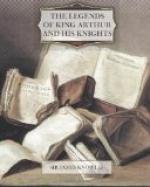Anon, his servant Governale, with Sir Lambegus sought him and found him safe among the rocks, and told him that King Mark had banished him and all his followers to avenge Sir Andret’s death. So they took ship and came to Brittany.
Now Sir Tristram, suffering great anguish from his wound, was told to seek Isoude, the daughter of the King of Brittany, for she alone could cure such wounds. Wherefore he went to King Howell’s court, and said, “Lord, I am come into this country to have help from thy daughter, for men tell me none but she may help me.” And Isoude gladly offering to do her best, within a month he was made whole.
While he abode still at that court, an earl named Grip made war upon King Howell, and besieged him; and Sir Kay Hedius, the king’s son, went forth against him, but was beaten in battle and sore wounded. Then the king praying Sir Tristram for his help, he took with him such knights as he could find, and on the morrow, in another battle, did such deeds of arms that all the land spake of him. For there he slew the earl with his own hands, and more than a hundred knights besides.
When he came back King Howell met him, and saluted him with every honour and rejoicing that could be thought of, and took him in his arms, and said, “Sir Tristram, all my kingdom will I resign to thee.”
“Nay,” answered he, “God forbid, for truly am I beholden to you for ever for your daughter’s sake.”
Then the king prayed him to take Isoude in marriage, with a great dower of lands and castles. To this Sir Tristram presently consenting anon they were wedded at the court.
But within a while Sir Tristram greatly longed to see Cornwall, and Sir Kay Hedius desired to go with him. So they took ship; but as soon as they were at sea the wind blew them upon the coast of North Wales, nigh to Castle Perilous, hard by a forest wherein were many strange adventures ofttimes to be met. Then said Sir Tristram to Sir Kay Hedius, “Let us prove some of them ere we depart.” So they took their horses and rode forth.
When they had ridden a mile or more, Sir Tristram spied a goodly knight before him well armed, who sat by a clear fountain with a strong horse near him, tied to an oak-tree. “Fair sir,” said he, when they came near, “ye seem to be a knight errant by your arms and harness, therefore make ready now to joust with one of us, or both.”
Thereat the knight spake not, but took his shield and buckled it round his neck, and leaping on his horse caught a spear from his squire’s hand.
Then said Sir Kay Hedius to Sir Tristram, “Let me assay him.”
“Do thy best,” said he.
So the two knights met, and Sir Kay Hedius fell sorely wounded in the breast.
“Thou hast well jousted,” cried Sir Tristram to the knight; “now make ready for me!”
“I am ready,” answered he, and encountered him, and smote him so heavily that he fell down from his horse. Whereat, being ashamed, he put his shield before him, and drew his sword, crying to the strange knight to do likewise. Then they fought on foot for well nigh two hours, till they were both weary.




